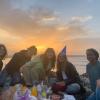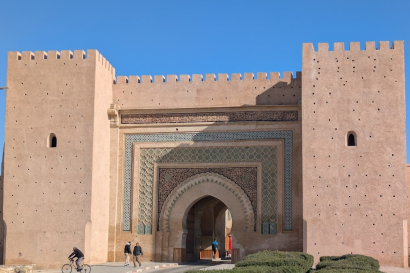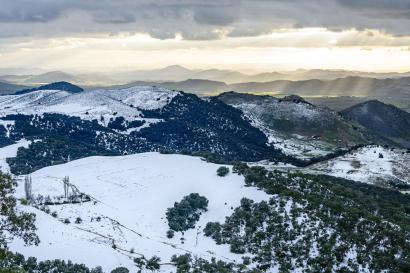The clocks turned back, the sun sank lower, and as darkness fell across the Kasbah by the sea, Ramadan had struck Rabat.
This holiday was one I had been long preparing for, it was the first thing I thought about when realizing I’d be going to Morocco in the Spring. t passed my mind every time I found myself enjoying a coffee in the afternoon after class, the impending knowledge that it would be fleeting. During my first two months in Rabat, every experience was twinged with the bittersweetness of knowledge it would all end too soon. There was nothing but the simple pleasure of sitting on the rocks by the Atlantic Ocean, watching the sun dance in the sky while enjoying a picnic with friends. So many of my happy memories revolved around food or drink, as is customary in the culture, that I was scared of what it would be like to have all that ripped away.
In truth, Ramadan didn’t change as much as I thought it would. The main thing that shifted was my schedule. Instead of eating at 10 or 11 p.m., as was customary in my host family, we started eating exactly at 6:45, when the sun went down and the prayer calls started to sound. Ftour would commence, a breaking of the fast grander than a typical Moroccan dinner. Ftour starts with eating a date, the traditional way of breaking a day’s fast. Afterward, my host family will dive into some harrira, a traditional chickpea soup, followed by some sort of bread dish, then a tagine, and lastly complete with coffee, tea, and a hell of a lot of hailiwyat (Moroccan sweets). This massive meal is followed by a later tea and snack break around 11 pm, and then another larger meal around 4 a.m.
Now, of course, there’s the decision to fast. All Moroccans are fasting (or at least give the appearance of fasting), whereas Americans are not expecting to, though many others in my cohort have decided to try it as a form of cultural experience. My Islamic Religion professor was telling me that young Americans are the only non-Muslims he’s ever encountered that will try fasting, which is pretty indicative of American students’ views on studying abroad, at least in my experience. Personally, I’ve chosen to only fast on the weekends when I’m in Rabat which is a decision caused less by not wanting to fast, and more caused by not wanting to wake up at 4 a.m. I also felt that fasting during the school day would have been distracting for me personally, and while I want to experience new elements of the culture, I also wanted to still pay attention to my studies. All of us non-Muslims have had to make our own personal choice on what to do and there’s no right or wrong, just what best works for the individual.
Going out-wise, I was pretty correct about everything shutting down. During the day, all the cafes I used to frequent are normally closed. Nightlife has changed, as iftar lasts until around 8 p.m., and then close after everyone goes to the Mosque. There are a few events and stores open around 10 p.m., but as Ramadan has an extra focus on piety and prudence, most events are pretty low-key.
Still, losing cafes and concerts is worth seeing this incredible part of Moroccan culture. Ramadan has truly shown me the extent of Islam’s influence on this country, and given me so many experiences that would be impossible to obtain as a simple tourist. And picnics on the beach are still possible, they just have to be after sundown!

Zoe Carver
Zoe Carver is a second-year student of International Affairs and Peace Studies at the George Washington University, minoring in French and Creative Writing. She is originally from Portland, Oregon and is apart of GW's Literary Magazine, Model UN team, and Student Climate Coalition. She just finished a positon interning in the United States Senate, and has a deep love for crocheting.







